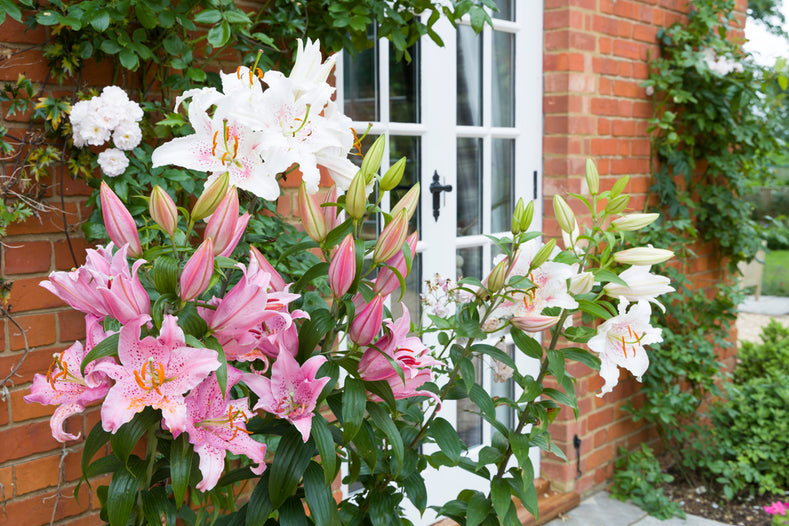Lilium, a category of herbaceous flowering plants that sprout from bulbs, is known for its impressive and sizable blossoms. Lily plants exhibit a wide array of colours and varieties, ranging from the exotic, intricate lilies adorned with painted petals speckled in both light and dark dots to the classic, graceful white lilies that radiate with pure white petals and striking red stamens. What unites all lilies is their timeless and sophisticated appearance, characterised by generously sized triangular petals that unfurl and gracefully curve back, revealing the delicate stamen at the heart of the flower.
When it comes to fragrance, there's a distinction: Asiatic Lilies have no scent, while Oriental Lilies are celebrated for their incredible and captivating fragrance.
Asiatic Lilies grace your garden with their blooms in the early to midsummer months, while Oriental Lilies take centre stage in mid to late summer. To enjoy a continuous display of lily flowers throughout the summer, many gardeners opt to plant both types.

When to plant Lilies?
Plant in early spring when the ground is workable but not muddy. Plant in the spring in well-drained, compost enriched soil.
Planting lilies successfully involves a few key steps:
Soil Preparation: To provide the best growing conditions, plant your lilies in soil enriched with leaf mould or compost. Ensure a balance of sunlight for the blooms and shade for the roots. Consider planting them alongside annuals or perennials that offer shade to their roots.
Planting Depth: Place the bulbs with their roots facing downward and the scales pointing upward. Position them about 10–15 cm below the soil surface, with the slightly pointed end of the bulb facing upward.
Watering: After planting, thoroughly water the area two or three times to help settle the soil and provide initial hydration to the bulbs.
Group Planting: Lilies tend to have a more striking impact when planted in groups of three or more. Allow about a foot of space between each bulb, as they will naturally spread and fill the space over time.
For container planting:
Container Selection: Choose a container with proper drainage holes that is spacious enough to accommodate the mature size of your lilies.
Soil Preparation: Fill the container with high-quality, well-draining soil.
Planting Depth: Dig holes in the soil and place your lily bulbs about 30-40 cm apart. Ensure the bulbs are positioned 10-15 cm into the soil with the pointed part facing upwards.
Watering: Water thoroughly to soak the soil and help it settle around the bulbs.
Following these steps will ensure your lilies thrive and bring vibrant beauty to your garden or containers!

Taking proper care of your lilies ensures their health and longevity:
Watering: During the active growth periods, provide adequate water as needed. A general guideline is to maintain about 1 inch of moisture per week.
Mulching: Apply a layer of mulch around the lily plant to help regulate soil temperature, keeping the roots cool and moderately moist, but not overly wet, during their growth phases.
Fertilising: Apply a high-potassium fertiliser every couple of weeks, starting from planting and continuing until approximately 6 weeks after the flowering season.
Leaf Maintenance: After the blooming season concludes, leave the foliage intact. The leaves will capture sunlight and perform photosynthesis, nourishing the bulb for future growth and flowering.
Dormancy: When the lily leaves begin to turn yellow and wither, signalling their entry into dormancy, you can remove the foliage. Additionally, decrease the frequency of watering during this period.
Lily blooms typically remain vibrant for at least two weeks, often longer, and the plants themselves can be long-lived. Assuming your lilies are well-suited to your climate zone, they will return year after year, providing you with their exquisite beauty and fragrance.

